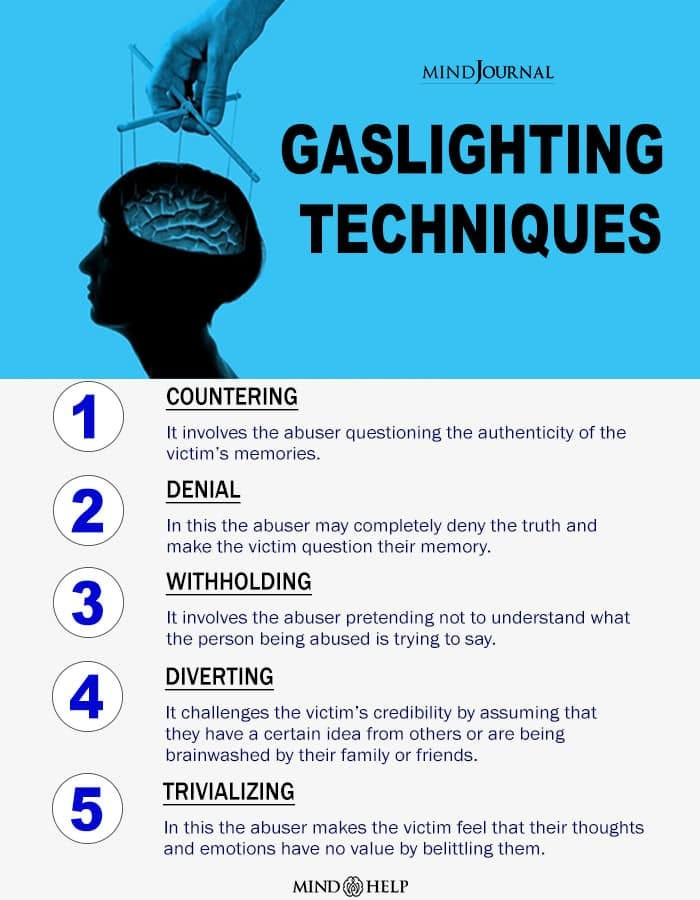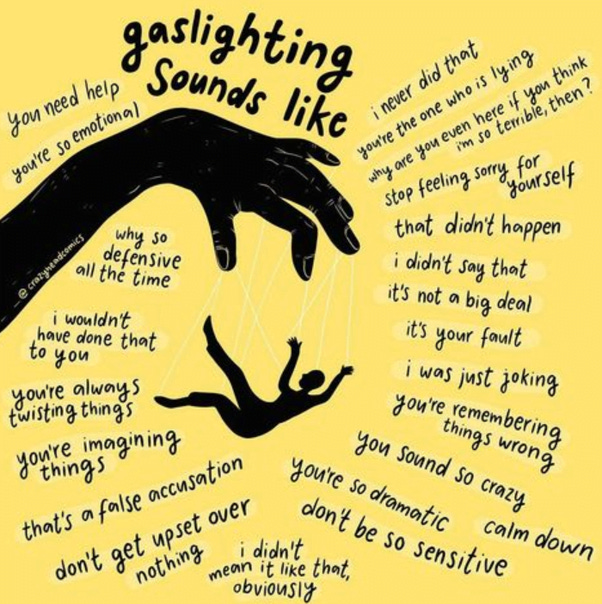The Power and Perils of Gaslighting: Understanding and Overcoming Psychological Manipulation
When Reality is Under Attack: A Comprehensive Guide to Gaslighting
When Reality is Under Attack: A Comprehensive Guide to Gaslighting
Thank you for choosing to read my article on gaslighting. This is a topic that I believe we, as human beings, should be very aware of. We have a long way to go to reach a utopian society, and until that day comes, we need to learn about human nature and what we are capable of, both good and bad. Learning about cognitive biases and psychological trickery can definitely help us navigate life’s journey smoothly and protect ourselves from the harm that people may intentionally or unintentionally cause to one another. In this article, I am going to explore the fascinating yet unsettling world of gaslighting, a form of psychological manipulation that can have serious consequences for the victim.
So, what exactly is gaslighting? Put simply, gaslighting is a tactic used to make someone doubt their own thoughts, feelings, and memories. This can be achieved in a variety of ways, such as denying something that the victim knows to be true, planting false information, or even manipulating the environment to create a sense of confusion and disorientation.
The term “gaslighting” actually originates from a 1938 play called “Gas Light,” in which a husband manipulates his wife into thinking she is going insane by dimming the gas lights in their house and denying that anything has changed. This example illustrates the insidious nature of gaslighting, as it can be difficult to recognize when it’s happening to you, and can leave you feeling like you’re losing your grip on reality.
In the following sections, I am trying to delve deeper into the tactics and techniques of gaslighting, its effects on mental health and relationships, and how to recognize and combat it. So let’s get started!
Tactics and Techniques
Now that we know what gaslighting is, let’s take a closer look at the tactics and techniques used to achieve it. Gaslighters are masters of manipulation, and can use a variety of methods to make their victims doubt themselves and their perceptions.

One common tactic is to simply deny the victim’s experiences or feelings. For example, a gaslighter might say something like, “That never happened,” or “You’re just being overly sensitive.” By dismissing the victim’s thoughts and emotions, the gaslighter can make them feel like their reality is invalid.
Another technique is to use false information to confuse and disorient the victim. Gaslighters might lie about events or conversations, or twist the truth to make the victim doubt their memory. They may also use selective memory, only acknowledging parts of a conversation that support their narrative and ignoring anything that doesn’t.
Gaslighters can also manipulate the environment to create a sense of confusion and disorientation. They might move things around or hide objects, then deny that anything has changed. This can make the victim feel like they’re losing their mind, as they can’t trust their own perceptions.
It’s important to note that gaslighting tactics can be subtle and difficult to recognize. Gaslighters are often skilled at making their manipulation seem like innocent misunderstandings or mistakes. However, if you find yourself constantly questioning your own thoughts and feelings, or feeling like you’re going crazy, it’s possible that you may be experiencing gaslighting.
Psychological and Emotional Effects
Gaslighting can have serious psychological and emotional effects on its victims. When someone is constantly made to doubt their own thoughts and feelings, it can lead to a sense of confusion, anxiety, and even depression.
Let’s explore the signs and then move to their impacts. Below, I try to list some signs that you’re experiencing gaslighting:
Constantly doubting your own thoughts and feelings
Feeling like you’re losing your grip on reality
Questioning your own memory or perception of events
Feeling like you’re constantly walking on eggshells around someone
Feeling like you can’t do anything right, or that you’re constantly making mistakes
Feeling like you’re always apologizing, even when you haven’t done anything wrong
Feeling like you’re going crazy or losing your mind.
One of the most significant effects is the erosion of self-confidence and self-esteem. When someone is constantly told that their experiences and feelings are invalid, it can lead to a sense of self-doubt and self-blame. Victims may start to question their own judgment and decision-making abilities, which can have far-reaching consequences in all areas of their lives.
It can also cause feelings of anxiety and paranoia. Victims may start to feel like they’re constantly being watched or monitored, or that they can’t trust anyone, including themselves. This can lead to feelings of isolation and social withdrawal, as victims may start to avoid situations where they feel vulnerable to manipulation.
Over time, gaslighting can even lead to symptoms of depression. Victims may start to feel hopeless and helpless, as they struggle to make sense of their own experiences and perceptions. They may also experience physical symptoms, such as fatigue and headaches, as the stress of the gaslighting takes its toll on their body.
It’s important to remember that gaslighting is a form of abuse, and it’s never the victim’s fault. If you or someone you know is experiencing gaslighting, it’s important to seek help and support from a trusted friend, family member, or mental health professional.
Gaslighting in Relationships
Gaslighting can occur in a variety of relationships, from intimate partnerships to workplace dynamics. Let’s explore some common scenarios where it can occur, and the impact it can have on the relationship.
In intimate relationships, it can be particularly damaging. A gaslighter may use tactics like minimizing the victim’s concerns, denying their experiences, or even blame-shifting to make the victim doubt themselves. This can lead to a sense of powerlessness and isolation, as the victim may start to feel like they can’t trust their own partner.
Gaslighting can also occur in familial relationships, such as parent-child or sibling dynamics. In these cases, the gaslighter may use their authority or familial ties to manipulate the victim. For example, a parent might deny abuse or neglect, or a sibling might twist the truth to make the victim doubt their own memory.
In workplace relationships, gaslighting can manifest in a variety of ways. A boss or coworker might deny or minimize the victim’s contributions, gaslight them into thinking they’re not doing their job correctly, or even sabotage their work to make them doubt their own abilities. This can lead to a toxic work environment and even impact the victim’s career prospects.
Gaslighting in Society
Gaslighting isn’t just limited to individual relationships — it can also occur on a societal level. Let’s see how it can be used to perpetuate systemic oppression, and the role it plays in social and cultural contexts.
It can be used by those in positions of power to deny the experiences and perspectives of marginalized groups. For example, a politician might deny the existence of racism or sexism, or blame marginalized groups for their own oppression. This can lead to a sense of erasure and invisibility, as the experiences of those groups are dismissed or ignored.
It can also be used to manipulate public perception and create a sense of confusion or chaos. For example, media outlets might spread false information or sow doubt about legitimate news sources, leading to a sense of uncertainty about what’s true and what’s not. This can create an environment in which the truth is constantly in question, and those in power can manipulate the narrative to their own advantage.
It can also play a role in perpetuating systemic oppression. For example, a gaslighter might blame a victim of domestic violence for the abuse, telling them that they’re overreacting or that the abuse is their own fault. This can lead to a sense of shame and self-blame, and make it harder for the victim to seek help or leave the situation.
It’s important to recognize the ways in which gaslighting can be used to perpetuate systemic oppression, and to challenge those who engage in this behavior. By standing up for the experiences and perspectives of marginalized groups, we can work to create a more just and equitable society for all.
Prevention and Recovery
It can be a difficult pattern to break, but there are strategies you can use to recognize and combat it. Let’s go through some ways to prevent gaslighting from happening, as well as resources for recovery and healing.
The first step in preventing gaslighting is to recognize the signs. If you find yourself constantly doubting your own thoughts and feelings, or feeling like you’re losing your grip on reality, it’s possible that you may be experiencing gaslighting. Trust your instincts, and don’t dismiss your own experiences.
Another important step is to set boundaries. If someone in your life is engaging in gaslighting behavior, it’s okay to tell them that their behavior is unacceptable and that you won’t tolerate it. This can be difficult, but it’s important to stand up for yourself and protect your own well-being.
There are also resources available for recovery and healing from gaslighting. Therapy can be an effective way to work through the trauma of gaslighting and rebuild your sense of self-worth. Support groups and online communities can also provide a sense of validation and support for those who have experienced it.
It’s important to remember that recovery is a process, and it may take time to fully heal. However, with the right support and resources, it is possible to reclaim your sense of self and build healthy, supportive relationships.
Building Resilience Against Gaslighting: Become Your Own Superhero!
Like a superhero preparing for battle, you can equip yourself with an arsenal of tools to fend off gaslighting and keep your mental fortress strong. Below I try to outline a few ways to become stronger.
Embrace the power of self-care: Just like how Batman retreats to his Batcave to recharge, you too should prioritize self-care. This means taking time for yourself, indulging in activities that make you happy, and nurturing your physical and emotional well-being. The more you care for yourself, the better equipped you’ll be to handle any psychological kryptonite thrown your way.
Get your Spidey-sense tingling: Cultivate your intuition and learn to trust your gut feelings. When something doesn’t feel right, listen to that inner voice — it might be your Spidey-sense alerting you to potential danger. Trusting yourself is key in building resilience against gaslighting.
Assemble your Avengers: No superhero is complete without their team of trusted allies. Surround yourself with a support network of friends, family, and mentors who uplift and empower you. These individuals can help validate your experiences, provide guidance, and offer a shoulder to lean on when things get tough.
Strengthen your emotional armor: Equip yourself with emotional intelligence and assertiveness skills. Learn to identify, understand, and manage your emotions, as well as communicate your boundaries and needs effectively. The stronger your emotional armor, the better prepared you’ll be to withstand any gaslighting attempts.
Knowledge is your superpower: Educate yourself about gaslighting and other forms of manipulation. The more you know, the better equipped you’ll be to recognize gaslighting when it occurs. Knowledge is power, and it’s one of the best weapons in your superhero arsenal.
Remember, you’re the hero of your own story: Work on building your self-esteem and self-confidence by recognizing your achievements, embracing your unique qualities, and celebrating your successes. Remind yourself that you are in control of your own narrative, and you have the power to write your own story.
Mindfulness and meditation — your secret weapons: Practice mindfulness and meditation to stay grounded and connected to your inner self. These techniques can help you remain present, focused, and aware of your thoughts and feelings, making it more difficult for gaslighters to shake your sense of reality.
Tips for Bystanders
It’s important to remember that, as a friend, family member, or colleague, you can play a crucial role in supporting the victim and helping them navigate this challenging situation. Below I share some tips that can make a difference!
Be a listening ear: Sometimes, all a person needs is someone to listen to their concerns without judgment or skepticism. Offer your support and give them space to share their experiences. Remember, you don’t have to be an expert or have all the answers; just being there for them can work wonders.
Share your observations: If you’ve noticed patterns of manipulation or inconsistencies in the suspected gaslighter’s behavior, gently share your observations with the victim.
Validate their feelings: Gaslighting can leave a person feeling like they’re going crazy or that their emotions are invalid. As a bystander, you can help counteract these effects by validating their feelings and assuring them that their experiences matter.
Encourage them to seek professional help: Gently suggest that the victim might benefit from talking to a mental health professional, counselor, or therapist. It’s crucial not to push or pressure them, but rather to make them aware of the option and its potential benefits.
Be patient and understanding: Recognize that overcoming gaslighting can be a long and challenging process. Be patient with the victim, and understand that they may need time and space to process their experiences and make decisions about how to move forward.
Promote self-care: Encourage the victim to engage in self-care activities that help them relax, recharge, and build resilience. This could include exercise, meditation, spending time with supportive friends, or pursuing hobbies and interests that bring them joy.
Remind them of their strengths: Gaslighting can erode a person’s self-confidence, so take the time to remind the victim of their accomplishments, talents, and positive qualities. By helping them see their worth, you can contribute to rebuilding their self-esteem.
Conclusion
In conclusion, gaslighting is a pervasive and insidious form of psychological manipulation that can have severe consequences on an individual’s mental health, relationships, and overall well-being.
By understanding the tactics and techniques used by gaslighters, recognizing the signs and effects of gaslighting, and acknowledging its presence in various contexts, we can better protect ourselves and support those who have been affected.
It is crucial to stand up against gaslighting, set boundaries, and seek help when needed. Through awareness, prevention, and recovery efforts, we can empower ourselves and others to overcome the trauma of gaslighting and foster healthier, more authentic relationships in our lives and society at large.
More Resources on Psychology
The Mental Tug-of-War: A Study of Cognitive Dissonance and its Consequences (link)
Mind Over Matter: The Science Behind Availability Heuristic in Everyday Life (link)
Beyond Self-Delusion: The Science of Illusory Superiority (link)
Uncovering the Roots of Self-Serving Bias (link)
The Dark Side of Attribution: How Our Perceptions Can Impact Relationships and Decisions (link)
Following The Crowd: The Psychology Of The Bandwagon Effect (link)
Perception, Interpretation, and Bias: Examining Actor-Observer Dynamics (link)
The Impact of Negativity Bias on Mood, Decision Making, and Relationships (link)
Hindsight Bias: Understanding the Psychology Behind Our 20/20 Vision (link)
How to Win Friends and Influence People: The Ben Franklin Effect (link)
From Pessimism to Paralysis: The Role of ‘Declinism’ in Shaping Our Social and Political Reality (link)
The High Cost of Naive Cynicism: How Pessimism and Distrust Hold Us Back (link)
How to Win Friends and Influence People: The Ben Franklin Effect (link)
The Genetics and Neuroscience of General Intelligence: Implications for Education and Society (link)
The Illusion of Consensus: Understanding the False Consensus Effect (link)
I hope you enjoyed reading this 🙂. If you’d like to support me as a writer consider signing up to become a Medium member. It’s just $5 a month and you get unlimited access to Medium 🙏 .
Before leaving this page, I appreciate if you follow me on Medium and Linkedin 👉
Also, if you are a medium writer yourself, you can join my Linkedin group. In that group, I share curated articles about data and technology. You can find it: Linkedin Group. Also, if you like to collaborate, please join me as a group admin.





